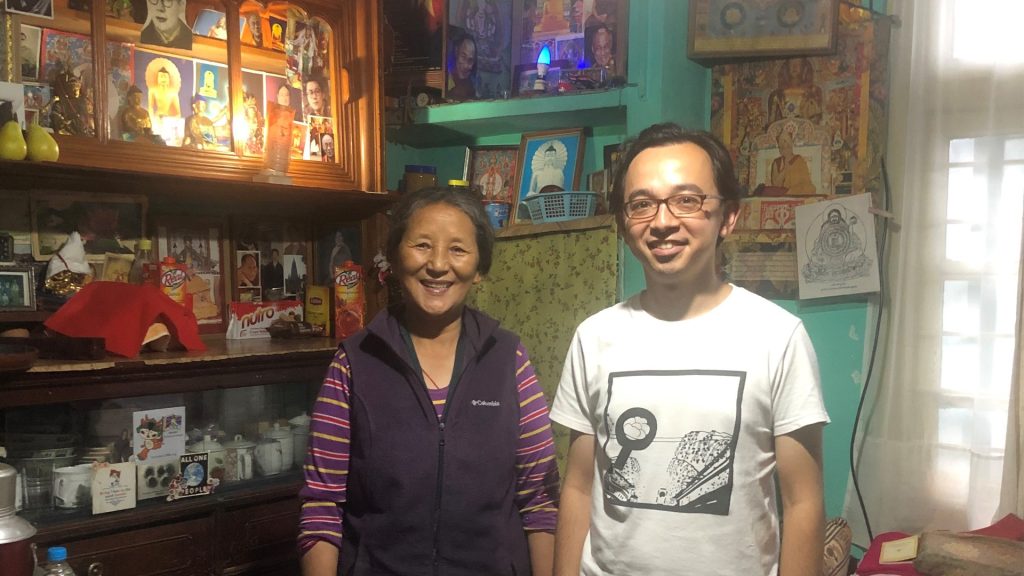Discovering Invisible Rules Behind the World’s Languages
August 15, 2022
IN BRIEF | 10 min read
- NUS Presidential Young Professor Michael Yoshitaka Erlewine hopes to build a community of scholars dedicated to the study of understudied languages of Southeast Asia.

As an Assistant Professor of Linguistics in the Department of English, Linguistics and Theatre Studies, Presidential Young Professor Michael Yoshitaka Erlewine studies how human language conveys complex meanings, with an emphasis on the grammars of understudied languages of Southeast Asia. His most recent papers investigate aspects of Burmese, Pangasinan (Philippines), Rejang (Indonesia), and Vietnamese.
He first discovered what would soon be his career while in high school; he pointed out to his French teacher that Mandarin, French and English all seem to have surprising similarities that connect them. His French teacher then encouraged him to look into linguistics.
“When we study the grammars of very different languages of the world, we notice many recurring patterns and principles in how they express complex thoughts. This is an important discovery.” Asst Prof Erlewine said. “At the same time, to a certain extent this is not surprising, because ultimately, these are all humans that are doing these things. You don’t teach children these grammatical rules, but they still can pick it up.”
But where languages diverge from one another can also be fruitful to study. Better understanding the precise ways in which languages vary can lead us to refine our theories of the human capacity for language.
Studying endangered languages
After completing college in 2007, Asst Prof Erlewine spent a year in Taiwan as part of the Fulbright English Teaching Assistant Programme. Fresh out of the University of Chicago, he would assist with teaching English in local elementary schools in a rural aboriginal village near Hualien for the year. The town’s people were predominantly Atayal, the third-largest indigenous group in Taiwan. Though the country has over 80,000 Atayal people, far fewer can speak the language fluently, with younger generations choosing to speak Mandarin or Hokkien instead.
For fun, Asst Prof Erlewine decided to learn Atayal from an elder who did not mind entertaining an enthusiastic foreigner. So, for the year, he learnt Atayal from simple children’s textbooks that he would buy in Taipei. His teacher had previously worked with foreign linguists, which explained why he was not averse to spending his time teaching a new college graduate the language.
Asst Prof Erlewine recalls that he one day thought about what motivated his teacher to cooperate with these academics. “He said: ‘In a generation or two, maybe no one will speak this language. But if by others studying it and describing it, we have something that can be passed down, then that is something that I could feel pride in’.
“That stuck with me and certainly made me interested in going down this route of doing work on understudied languages,” Asst Prof Erlewine said.
Learning from native speakers
Research often requires intensive fieldwork where linguists directly interact with native speakers, trying to tease out the nuanced rules that govern their language. Finding communities of such speakers is often challenging and, Asst Prof Erlewine believes, luck-based. “There is no magical formula for finding speakers. A lot of the time, research is directed by what languages you find yourself having access to,” he said.
Asst Prof Erlewine remembers how he started a three-year research project on Toba Batak – a minority language spoken in northern Sumatra - after meeting a Batak colleague at NUS. “She took me to her Batak church that meets in Singapore and I went a few times. There were maybe less than 50 congregants,” said Asst Prof Erlewine.
From that serendipitous meeting, he would go on to regularly meet with a couple of them over the next few years. “You start from scratch, just trying to learn things about this language, and it is really these individual relationships that we end up having to build,” Asst Prof Erlewine explained.

Fieldwork has also taken him out of the country to remote locations. It once took him to Dharamsala, a city surrounded by cedar forests near the edge of the Himalayas and the home of the largest Tibetan community outside of Tibet. Asst Prof Erlewine spent two summers in Dharamsala learning and studying Tibetan. “It was very stimulating to hear something that felt very remote early on, and something that felt very rare, all around you – spoken by people just living their life,” he said. He would sit in local cafés and be surrounded by the sounds of a language that is spoken by less than 0.1 per cent of the world. The memory serves as a constant reminder of how vast the field of under-studied languages really is.
Building a community of scholars in a young field
Many languages of Southeast Asia continue to be understudied in theoretical linguistics, including national languages such as Burmese and Thai, as well as languages spoken by minorities within those countries. Researching such languages is a behemoth task that Asst Prof Erlewine understands he cannot do alone.
“I put a lot of energy into, not just my own research directly, but in trying to build a community of scholars doing this kind of work,” he said. Since he joined NUS in 2015, Asst Prof Erlewine has worked alongside and supervised young linguists who go on to pursue PhDs, publish in international journals or present at international conferences. “It is very exciting and fulfilling to be able to raise young students and young scholars who go on to do really good work on these languages of Southeast Asia,” he said.
Impact of climate change on languages
The task of researching these languages will only increase in the next century. “Thinking about the study of language in the next 50 years, the story is going to be about climate change, and the changes to people's living situations as a result of environmental changes,” he said.
He believes that climate change will displace huge populations of people who escape from droughts, wars and other disasters. And migration inevitably would mean language contact as diasporic people begin to live alongside one another – bringing with it, language change, especially in Southeast Asia.
When reading one of Asst Prof Erlewine’s papers, one can see the mathematical concepts being invoked to describe language systems with empirical precision. But the researcher himself says that he never forgets what lies at the heart of his work. “The intellectual work that I do can be abstract to some degree, but ultimately, our focus is about people and the human experience,” he explained.
This story first appeared in NUSNews on 11 August 2022.

